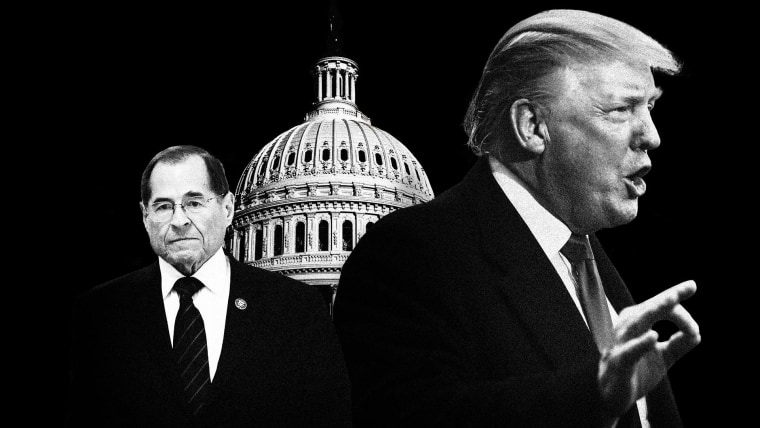Republicans originally argued that the House impeachment process was unfair because there'd been no formal vote on the House floor to authorize the inquiry. After the House did, in fact, hold such a vote, Republicans shifted their focus, complaining that the process is unfair because there were no public impeachment committee hearings.
After the House did, in fact, hold extensive public impeachment committee hearings, Republicans shifted again, insisting that the process is unfair because Donald Trump and his team were not given an opportunity to present a defense. Last week, the president and his White House attorneys were, in fact, invited to participate in the impeachment inquiry, and Team Trump refused to accept the offer.
There was some question, however, as to whether Team Trump might choose to play a role in future hearings. On Friday afternoon, in a letter that sounded a bit like the president himself, White House Counsel Pat Cipollone wrote to House Judiciary Committee Chairman Jerry Nadler (D-N.Y.) signaling that the boycott would continue. In read in part:
"As you know, your impeachment inquiry is completely baseless and has violated basic principles of due process and fundamental fairness. Nevertheless, the Speaker of the House yesterday ordered House Democrats to proceed with articles of impeachment before your Committee has heard a single shred of evidence."
Cipollone went on to condemn the constitutional impeachment process as "unconstitutional." (Oddly enough, the correspondence never got around to saying whether anyone from the White House would show up for the next hearing, though an administration official eventually confirmed to NBC News that no one would participate.)
It's worth pausing to acknowledge what a genuine shame it is to see the White House Counsel's Office reduced to official correspondence this pitiful, especially after House members have been presented with a mountain of evidence, all of which has gone uncontested. As George Conway put it, "It's an utter embarrassment that any member of the bar, let alone the White House counsel, would write, sign, or send this letter."
For his part, Nadler released a statement noting that his committee gave the president "a fair opportunity to question witnesses and present his own to address the overwhelming evidence before us. After listening to him complain about the impeachment process, we had hoped that he might accept our invitation. If the president has no good response to the allegations, then he would not want to appear before the committee. Having declined this opportunity, he cannot claim that the process is unfair."
The chairman's point is compelling. Trump and his allies whined incessantly for weeks, insisting that any process that denies the White House an opportunity to present a defense is inherently unjust. And yet, when Congress extended Team Trump the opportunity it sought, the president and his lawyers chose to boycott the proceedings.
As we discussed last week, the one thing Team Trump said it wanted most -- a chance to participate and present a defense -- now appears to be the thing Team Trump won't accept.
It's enough to make one wonder whether Team Trump is struggling to come up with something remotely persuasive.
The White House's posture will, oddly enough, help House Democrats proceed faster -- to the delight of the party's leadership -- and create a dynamic in which the Democratic case against the president goes effectively unchallenged.
As things stand, the House majority released a report over the weekend laying out the "legal and historical underpinnings" of their case. This set the stage for another Judiciary Committee hearing, set to begin in about a half-hour, in which members will hear majority and minority counsels from the Judiciary and Intelligence committees. The hearing, which is open to the public, will feature testimony from Judiciary Majority Counsel Barry Berks, Intel Majority Counsel Daniel Goldman, and Minority Counsel Stephen Castor.
Watch this space.
